Posts by Breakstone, White & Gluck
Project KidSafe: Bicycle Helmet Donations for Norwood Police and Bikes Not Bombs
As we continue our 2017 Project KidSafe campaign, Breakstone, White & Gluck wants to share a few recent bike helmet donations and some bicycle safety tips for children over the Memorial Day weekend.
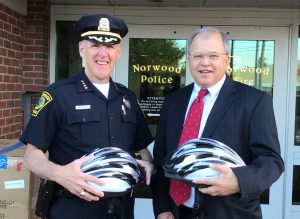 Breakstone, White & Gluck was pleased to donate 100 bicycle helmets to the Norwood Police Department for the third year. Attorney David W. White delivered the helmets to Norwood Police Chief William G. Brooks III in early May. The Norwood Police Department now plans to distribute the helmets at a bike safety event being planned for June. If you live in Norwood, watch local community calendars.
Breakstone, White & Gluck was pleased to donate 100 bicycle helmets to the Norwood Police Department for the third year. Attorney David W. White delivered the helmets to Norwood Police Chief William G. Brooks III in early May. The Norwood Police Department now plans to distribute the helmets at a bike safety event being planned for June. If you live in Norwood, watch local community calendars.
It was also our pleasure to donate 170 bicycle helmets to Bikes Not Bombs in Jamaica Plain. Founded in 1984, Bikes Not Bombs works to repair used bikes locally and internationally to help individuals. This was the fifth year we have made this donation.
In Boston, Bikes Not Bombs offers a popular Earn-A-Bike program, which teaches children and teenagers how to ride in the city and repair bikes during a six-week session. Students are taken on group rides and get to help refurbish a bike to take home. Each graduate also takes home a new bicycle helmet from our Project KidSafe campaign.
In addition to Earn-A-Bike, Bikes Not Bombs offers other programs for teenagers in the Boston area, aimed at helping them learn safe cycling skills and bike repair. These programs include Girls in Action and BOCA, a program which combines cycling and community action.
You may see a Bikes Not Bombs tent at local community events this Spring and Summer. The organization collects and rehabs bikes for people without access to transportation in Africa, Latin America and Caribbean. Bicycles provide a means of transportation and help individuals fight political oppression and rebuild communities. If you have an extra bike, consider making a donation. Learn more on the Bikes Not Bombs website.
Through our Project KidSafe campaign, Breakstone, White & Gluck has donated over 10,000 bicycle helmets to children in the Boston area since 2013. During the fifth year of our campaign, our goal continues to be to encourage children to wear a helmet every time they ride.
Study after study has shown wearing a helmet is the most effective way to protect you or your child from a head injury if you fall or are in a bicycle accident. Yet studies also show children are not always wearing helmets, even though many states have laws requiring helmet use for children. In Massachusetts, the law says children who are 16 years old and younger must wear helmets.
Earlier this month, the Today Show reported more than 400,000 kids are hurt each year while riding bikes, scooters, skateboards and skates or roller blades. Of the children injured on bikes, only 68 percent were wearing bike helmets, according to their parents.
As we approach the Memorial Day weekend, here are some reminders for helping young cyclists ride safe:
- Wear a bicycle helmet. Select a helmet for your child which meets the Consumer Product Safety Commission standard. Properly adjust it so it has a snug fit and will provide protection in case of a fall or a bicycle accident. If you need help, there is an instructional video on our website. Then, tell your child it is important to wear a helmet every time they ride. Be sure to wear your helmet, too. These last two steps are the most important.
- Wear neon and bright colors. Stock your child’s drawers up with neon t-shirts and other clothing. You want to help your child stand out to traffic, pedestrians and other cyclists. Search “neon clothing” on Amazon.com for ideas.
- Ride with your children. Enjoy cycling with your children and teach them safe riding techniques at the same time.
- Control your bicycle. Keep both hands on your handlebars and tell your child to do the same. Keep school backpacks light or use a bike basket. Encourage children to always look ahead and not turn around to talk to you or other cyclists while pedaling.
- No cell phone use. Do not let your child ride with their cell phone. If they must, make sure it is packed away in a backpack and turned off. Cell phone use is likely to lead to a bicycle accident.
- Check equipment. Before they ride, check your child’s bike. Make sure tires are properly inflated and that the brakes work.
- Avoid riding at night. Children should not ride at night until they are older and have more experience on the roads. If you ride at night, be aware that you are required to use lights and reflectors under Massachusetts law.
Slow Down! Boston, Cambridge and Other Cities Have Dropped Speeds to 25 MPH
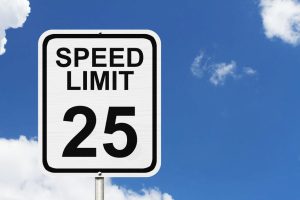 Over the past year, Boston, Cambridge and several other communities have lowered default speed limits from 30 to 25 mph, with a goal of creating safer streets for pedestrians and cyclists. Now it is Quincy’s turn.
Over the past year, Boston, Cambridge and several other communities have lowered default speed limits from 30 to 25 mph, with a goal of creating safer streets for pedestrians and cyclists. Now it is Quincy’s turn.
Last week, the Quincy City Council passed a measure establishing a speed limit of 25 mph, unless another speed limit is posted. The previous speed limit had been 30 mph. Once Mayor Thomas P. Koch signs the new law, officials will decide on an effective date.
In January 2017, the City of Boston dropped its default speed limit from 30 to 25 mph.
Lowering the speed limit was a key part of the Vision Zero Boston campaign, which was launched by Mayor Marty Walsh in 2015. The goal is to end traffic deaths and serious injuries in the City of Boston by 2030, through a combination of efforts, such as reducing speeds, eliminating distracted driving, and improving infrastructure for safer riding, walking and cycling.
While lowering speed limits was a critical step, the City of Boston was unable to act right away.
First, the city had to obtain approval from the state Legislature and Gov. Charlie Baker. Baker signed the Municipal Modernized bill in August 2016, which gave Boston, as well as cities and towns across the state, authority to reduce the default speed limit on local roads.
So far, these communities have reduced speed limits:
- Boston
- Cambridge
- Somerville
- Arlington
- Newton
- Randolph
- Scituate
- Quincy (approved by City Council)
Source: The Boston Globe.
Benefits to Slower Speed Limits
There is strong evidence that slower traffic means safer streets. An excellent example is New York City. In 2014, the city lowered speed limits to 25 mph on 90 percent of its streets. Over three years, traffic fatalities have decreased 23 percent and fell to the lowest number in the city’s history in 2016.
Boston city officials say that when crashes happen, faster vehicles are likely to cause the most serious injuries and fatalities. According to the City of Boston website, at 20 mph, there is a 17 percent likelihood that someone will be seriously injured or killed. At 40 mph, there is a 79 percent likelihood. Slower vehicles can be stopped more quickly, and the slower speeds allow for longer reaction times.
Read More
Cyclists Get Ready for Boston’s National Bike to Work Day Festival
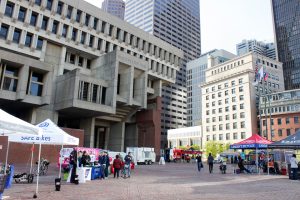
Boston Bike to Work Festival 2016
Breakstone, White & Gluck is pleased to participate in the National Bike to Work Day Festival on Boston City Hall Plaza this Friday. The festival is hosted by the City of Boston, which says, “We think it’s important to celebrate everyone who rides in Boston, and we want to make it easier for new riders to start commuting.”
Breakstone, White & Gluck couldn’t agree more. We will be attending for the third year. Stop by and say hello to Attorney David W. White at our Project KidSafe tent. David will be answering safety questions and sharing information about our Project KidSafe campaign. Over the past four years, Breakstone, White & Gluck has donated over 10,000 bicycle helmets to children in Massachusetts, with a goal of protecting young cyclists from serious head injuries. Under Massachusetts law, cyclists 16 years old and younger are required to wear helmets, but many children do not and are at risk.
We are donating an additional 4,000 helmets in the Boston area in 2017, all through community organizations. Many helmets will be donated in the city of Boston, including through the Boston Police Department and Boston Bikes’ Roll It Forward, a city program.
The Bike to Work Day Festival is part of Bay State Bike Week, a statewide lineup of cycling events which began May 13. Events continue through Sunday, May 21.
Check out Boston’s National Bike to Work Festival web page
Check out other Bay State Bike Week Events
Highlighted Events
MassCommute Bicycle Challenge (MCBC)
For the 23rd year, cyclists can compete in the MassCommute Bicycle Challenge. Cyclists who log their miles each day are eligible for daily prizes. Cyclists can compete individually or on teams organized by employer. The goal is to count just how many miles cyclists are logging. Last year was a record breaker, with 156,285 miles traveled.
If you can’t participate, we still encourage you to check out the MassCommute Bicycle Challenge website.
Wednesday Events
Harvard Bicycle Appreciation Breakfast. Cyclists traveling through Cambridge can stop in at the Harvard Bicycle Appreciation Breakfast at Dudley House Plaza. Event starts at 7:30 a.m. and cyclists are asked to RSVP.
Seaport Common Bike Tune-Up. In Boston, cyclists can take advantage of free bike tune-ups at Seaport Common starting at 7:30 a.m. Tune-ups are on a first come, first serve basis and the event is organized by the Seaport TMA, a nonprofit transportation management association.
Bike Breakfast. Bike commuters are also invited to stop by for a light breakfast and refreshments at the MassDOT building at 10 Park Plaza in Boston. Event starts at 7:30 a.m.
Thursday Events
Cambridge-Lexington Bike Caravan. If you are new to bike commuting, this is an event for you. The event starts at 1 Kendall Square in Cambridge at 7:30 a.m. Cyclists will commute down the Minuteman Bikeway to Somerville, Arlington and Lexington.
Waltham Night Ride. Join this short ride in Waltham, starting at 8 p.m. at Waltham City Hall. Minimal lights will be distributed to participants who need one for a $5 donation.
Boston Bike Commuter Numbers are Growing
We hope you can participate in an event this week. Over the past few years, Boston has seen a tremendous surge in bike commuters. According to 2015 US Census data, the number of Boston residents who regularly commute by bicycle more than tripled in a decade. Some 8,100 Boston residents pedaled to work in 2015, compared to 2,300 in 2005. Bay State Bike Week provides cyclists a good opportunity to learn more about safe riding.
Partnering With the Cambridge Police Department to Protect Kids Riding Bikes
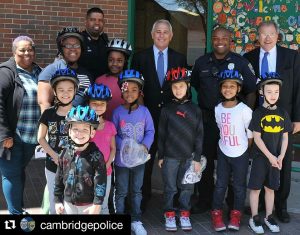
From 2016: Attorney Ron Gluck and Attorney David White joined Cambridge police officers and students at the Cambridgeport School. Breakstone, White & Gluck was there to donate bicycle helmets as part of our Project KidSafe campaign.
Read Cambridge Police Department’s 2017 National Bike Safety Month announcement.
Breakstone, White & Gluck is pleased to partner with the Cambridge Police Department again to encourage children to wear bicycle helmets during National Bike Safety Month. As part of our Project KidSafe campaign, we recently donated 180 bicycle helmets for Cambridge police officers to give to children who need one.
Over the past four years, Breakstone, White & Gluck and our Project KidSafe campaign have donated more than 10,000 bicycle helmets in Boston, Cambridge, Somerville and other communities. In Cambridge, we have worked with the police department, as well as CYCLE Kids, a non-profit cycling organization which teaches children safe riding and healthy eating here in Massachusetts and across the country.
Bicycle helmets are a critical tool for cyclists. The National Highway Traffic Safety Administration (NHTSA) has reported bicycle helmets are 85-88 percent effective in preventing head and brain injuries. Helmets make all the difference for cyclists, especially young children who are vulnerable to injuries as they learn to ride and grow.
Under Massachusetts law, cyclists 16 years old and younger are required to wear helmets. This has been the law for more than 10 years in Massachusetts, yet many children still ride without one. There are many reasons, from the high cost of helmets to the fact that kids often outgrow them quickly. Also, until you are shown, helmets can be challenging to properly fit.
In Cambridge, cycling and pedestrian safety is a paramount topic. As home to more than 100,000 residents, Harvard University and major pharmaceutical companies, Cambridge has some of the most heavily traveled streets in Massachusetts. Over the past year, the city has seen two cyclists killed in bicycle accidents in Inman Square and Porter Square.
Over the next few weeks, Cambridge Police and the Cambridge Community Development Department are hosting a full line-up of events for National Bike Safety Month. Students began the month with Walk to School Day. Over the next few weeks, older cyclists are invited to stop in at community breakfasts, where there will be bike lights and other giveaways. Need tips on fixing your bike? Two bicycle maintenance workshops will be offered on May 17th, along with a citywide “Bow Tie Bike Ride” on May 20th.
Breakstone, White & Gluck Makes Kids’ Bicycle Helmet Donations in Quincy, Framingham and Westborough
Breakstone, White & Gluck is committed to protecting children on bicycles from serious head injuries. For the fifth year, our law firm will donate bicycle helmets to children in the Boston area as part of our Project KidSafe campaign. Once again, we are pleased to partner up with local police departments, schools, bicycle committees and community organizations to distribute the helmets.
Over the past four years, Breakstone, White & Gluck has donated more than 10,000 bicycle helmets to children. We are excited about the year ahead and invite you to follow along: www.facebook.com/bwglaw.
Over the weekend, Breakstone, White & Gluck donated more than 350 bicycle helmets to three organizations:
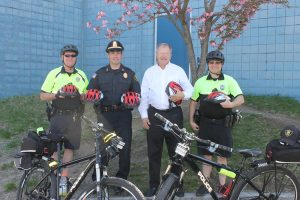
Quincy Police Department. Attorney David W. White delivered 100 bicycle helmets to the Quincy Police Department on Friday afternoon. He was greeted by the Community Policing Unit, including: Officer White, Lieutenant Bina, and Officer Miller (shown in this photo with Attorney White. Photo courtesy of Quincy Police).
On Saturday, Quincy police officers gave the helmets away and spoke to families about bicycle safety at the Healthy Kids Day event at the South Shore YMCA. Read the Quincy police department’s announcement on our donation and bicycle safety tips.
Framingham Earth Day. We partnered up with the Framingham Bicycle and Pedestrian Advisory Committee and Framingham Police Department for the fourth year, fitting children for helmets at the annual Framingham Earth Day celebration. The community welcomed us back as we fit 140 helmets and answered bicycle safety questions from families. The donation was coordinated by Bill Hanson, chair of the Framingham Bicycle and Pedestrian Advisory Committee. We are lucky to have Bill’s help; he has coordinated the donation for the past four years. Bill was also out fitting helmets for the kids, along with Attorney David W. White of Breakstone, White & Gluck and Framingham Police Officer Garrett Coffin.
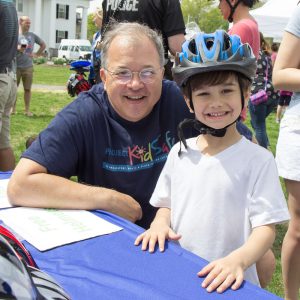
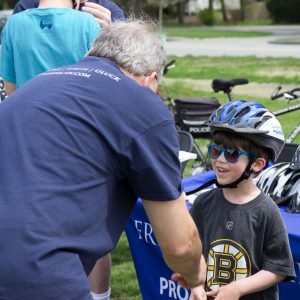
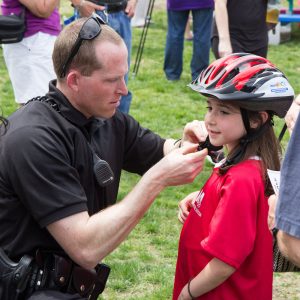
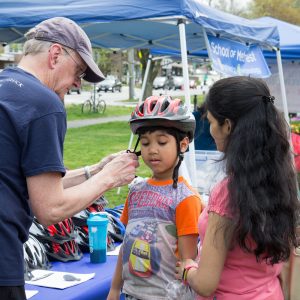
Healthy Kids Day. For the fourth year, we donated more than 100 bicycle helmets for the Healthy Kids event at the Boroughs Family Branch of the YMCA of Central Massachusetts. The event was held on Saturday. The donation was coordinated by Bruce Tretter of the Westborough Bicycle & Pedestrian Advisory Committee, who was also on hand to fit helmets for the kids (he is shown in the photo below). Bruce has coordinated this donation for the past four years and we appreciate his efforts.
On June 10th, Attorney David W. White will join Bruce and the Westborough Bicycle & Pedestrian Advisory Committee at Spring Festival. This event is sponsored by the Rotary Club of Westborough.
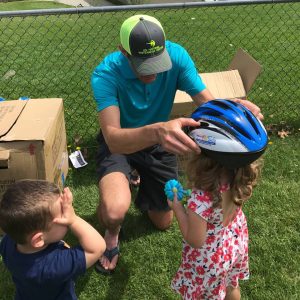
Highlights from our 2017 Project KidSafe campaign:
-Breakstone, White & Gluck will partner with more than 30 community partners this year, including police departments, bicycle committees, schools and community organizations.
-We will donate 1,500 helmets within the City of Boston, including 600 helmets to the City of Boston. The Boston Police Department and Boston Bikes’ Roll It Forward initiative will receive helmets.
-Partner organizations include 10 police departments, including Boston, Cambridge, Quincy, Everett, Randolph. Dedham, Norwood, Waltham, Framingham and Malden.
-Safe Routes to School in Massachusetts will receive 400 helmets for children in need who participate in its bicycle safety programming.
-We will partner up with CYCLE Kids and Somerville Public Schools again in June. Fifth-graders who finished the CYCLE Kids bicycle safety program will receive a brand-new helmet for safe summer riding.
After Food Poisoning Scare at Chicken & Rice Guys, Do You Know Your Rights When Dining Out?
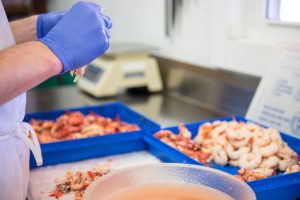
Improper food preparation is one source of food poisoning.
Chicken & Rice Guys shutdown restaurants and food trucks in Boston and Medford earlier this month for more than a week, after 14 people became ill with E. coli. Ten people had to be hospitalized. Given the widespread food poisoning outbreak, it is likely that there will be liability claims against Chicken & Rice Guys for the poisonings.
According to The Boston Globe, the illness was caused by the Shiga toxin-producing Escherichia coli 0157:H7, the most common strain of E. coli in the United States. The Mayo Clinic reports a person can contract this type of E. coli through:
- Exposure to contaminated food, such as raw vegetables or undercooked ground beef
- Contact with an infected person
- Exposure to food which has not been properly handled
Symptoms typically occur within three or four days and can include severe abdominal cramps, diarrhea, vomiting and nausea. Younger children and older adults are the most vulnerable. In some cases, kidney failure can develop and be fatal.
According to news reports, the City of Boston Inspectional Services gave Chicken & Rice Guys approval to re-open its Boston restaurants. The Medford location is also back in business, but the five local food trucks remain closed.
Boston Food Poisoning Cases
Unfortunately, food poisoning is quite common. Each year, 1 in 6 Americans become sick after consuming contaminated food, according to the Centers for Disease Control and Prevention
When restaurants and food trucks are the cause, food poisoning can spread quickly. Remember the Boston College outbreak of 2015? More than 130 students fell ill after eating at the Chipotle Mexican Grille Restaurant in Cleveland Circle. The contamination was initially believed to be E. coli, because the Chipotle chain was in the middle of a nationwide E. coli food poisoning outbreak, which ultimately sickened 60 people in 14 states.
As it turned out, the Boston College students were suffering from norovirus. At least one student filed a lawsuit against the local Chipotle’s.
Your Legal Rights at Restaurants
Diners have rights when eating out. Restaurants and food trucks must follow health regulations set by their local community and the Commonwealth of Massachusetts. The most basic regulations include:
- Employees must wash their hands before handling food
- Meat should be cooked to the proper temperature.
- The restaurant should be kept clean.
If you see a restaurant violating a health regulation, you can alert the staff or ask to speak to the manager. You can also report it to the city’s local health department.
The City of Boston is now offering a great resource for consumers: a letter-grade system for Boston restaurants. Consumers can search the grades online. At some point, restaurants will be required to post grades on storefronts or face fines of $300 per day.
If You Suffer Food Poisoning, Contact a Boston Personal Injury Lawyer
If you suffer food poisoning after eating at a restaurant, you may be entitled to file a claim for negligence and obtain financial compensation. Contact the lawyers of Breakstone, White & Gluck in Boston to help you investigate, determine if you have a case and identify who may be liable for your injuries. There are several parties who may be responsible, including the restaurant, food truck, food distributors and food manufacturers.
For a free legal consultation, contact Breakstone, White & Gluck at 617-723-7676 or 800-379-1244 or use our contact form.
Attorney David W. White Interviewed About Future of Civil Lawsuits Following Aaron Hernandez Suicide
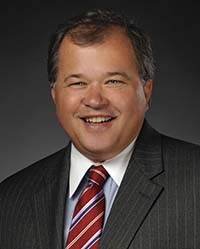 The Metro news website interviewed Attorney David W. White and other legal experts in the wake of Aaron Hernandez’ suicide at Souza Baranowski Correctional Center in Shirley, Massachusetts this week. Hernandez, a former New England Patriot who once received a $40 million contract extension for five years, had been serving a life sentence in the 2013 murder of Odin Lloyd. As prosecutors prepared the Odin Lloyd case, they also charged Hernandez with a double murder in Boston in 2012. Hernandez was acquitted on the Boston murder charges just last week in Suffolk Superior Court. As he headed back to prison, his lawyer spoke about hopes for appealing the Odin Lloyd conviction and seeing Hernandez walk free someday.
The Metro news website interviewed Attorney David W. White and other legal experts in the wake of Aaron Hernandez’ suicide at Souza Baranowski Correctional Center in Shirley, Massachusetts this week. Hernandez, a former New England Patriot who once received a $40 million contract extension for five years, had been serving a life sentence in the 2013 murder of Odin Lloyd. As prosecutors prepared the Odin Lloyd case, they also charged Hernandez with a double murder in Boston in 2012. Hernandez was acquitted on the Boston murder charges just last week in Suffolk Superior Court. As he headed back to prison, his lawyer spoke about hopes for appealing the Odin Lloyd conviction and seeing Hernandez walk free someday.
But Hernandez apparently had no plans for appeal. Come Wednesday morning, he was found hanging from a bed sheet in his cell at the Shirley prison. The state medical examiner concluded the cause of death was suicide by asphyxia from hanging. The football player’s brain will be sent to Boston University researchers who are studying CTE, or Chronic Traumatic Encephalopathy, a progressive degenerative disease of the brain which can only be diagnosed after death. It has been found in other football players.
The suicide changes everything for Odin Lloyd’s family, who was pursuing a wrongful death lawsuit against Hernandez.
During a 2015 trial, Hernandez had been convicted of the first degree murder of Lloyd. Hernandez had an automatic right to appeal to the state’s highest court, the Supreme Judicial Court, but had not completed that appeal. Massachusetts follows a legal doctrine known as abatement ab inito. If someone dies after a conviction but before their appeal is complete, the person’s legal records and convictions are null and void.
“Now that the conviction will be vacated, the family of Odin Lloyd has lost their collateral estoppel claim and they will have to start from scratch to prove he is guilty,” White said in the Metro interview.
Hernandez appeared to have a bright future with the Patriots, then came June 26, 2013. Police arrested him at his North Attleborough home in connection with the murder of Odin Lloyd, a semi-professional football player who had been dating the sister of Hernandez’ fiancee. Less than two hours later, Hernandez was released by the New England Patriots, who had signed him to the $40 million five-year contract extension the previous summer. The contract included a $12.5 million signing bonus. On August 27, 2012, The Boston Globe predicted, “The Patriots are going to have the tight end of duo of Rob Gronkowski and Aaron Hernandez at least through the 2018 season.”
Attorney Marc Breakstone Teaches Arlington Students His Bike Safety Pledge
Attorney Marc L. Breakstone’s message to fifth graders in Arlington yesterday? Ride safe.
Breakstone, White & Gluck kicked off our 2017 Project KidSafe campaign yesterday, donating 50 helmets to Peirce Elementary School in Arlington. Attorney Breakstone participated in a bike safety training led by Richard Fries, executive director of MassBike. Helmets were distributed to children who needed one after the training.
The training was coordinated by Mary Alice Burke, the school’s parent coordinator of Safe Routes to School programming. Nicole Edmonds, a school outreach coordinator for the Safe Routes to School office in Boston and Arlington Police Officer Corey Rateau also participated.
Launched in 2013, Breakstone, White & Gluck’s Project KidSafe campaign has donated more than 10,000 helmets to children, with a goal of preventing serious head injuries and encouraging safe riding. Under Massachusetts law, all cyclists age 16 or younger must wear bicycle helmets. But all cyclists are strongly encouraged to wear helmets, regardless of age. According to the National Highway Traffic Safety Administration, helmets can reduce the risk of head and brain injuries in bicycle accidents by up to 88 percent, making them the single most effective way to reduce head injuries and save lives.
This is the fourth year we have donated bicycle helmets to children in the Arlington community. In Arlington, our helmets support Safe Routes to School bike and pedestrian training in elementary schools. In addition to Peirce Elementary School, we will also donate make donations to the Hardy Elementary School and the Arlington Bicycle Advisory Committee this year. The Arlington Bicycle Advisory Committee will distribute helmets to children who need one at Arlington Town Day in the Fall.
Learn more about our Project KidSafe bike safety campaign.
About Breakstone, White & Gluck
Breakstone, White & Gluck is a Boston personal injury law firm which is committed to the safety of all bicyclists in Massachusetts. We have over 100 years combined experience representing bicyclists injured by the negligence of others. If you, or a member of your family, has been injured in a bicycle incident, please feel free to contact us for a free legal consultation at 800-379-1244 or 617-723-7676 or use our contact form. Thank you and RIDE SAFE!
Massachusetts Bar Association to Honor Attorney David W. White with President’s Award
 The Massachusetts Bar Association (MBA) has announced it will honor Attorney David W. White with the MBA President’s Award at its May 4th Annual Dinner. The President’s Award is bestowed upon those individuals who have made a significant contribution to the work of the MBA, to the preservation of MBA values, to the success of MBA initiatives and to the promotion of the MBA’s leadership role within the legal community of Massachusetts.
The Massachusetts Bar Association (MBA) has announced it will honor Attorney David W. White with the MBA President’s Award at its May 4th Annual Dinner. The President’s Award is bestowed upon those individuals who have made a significant contribution to the work of the MBA, to the preservation of MBA values, to the success of MBA initiatives and to the promotion of the MBA’s leadership role within the legal community of Massachusetts.
Attorney White is a past president of the MBA from 2007-2008. While serving as MBA president from 2007-08, White formed the Drug Policy Task Force, which made numerous recommendations for criminal sentencing reform and drug treatment in Massachusetts. He also led the Lawyers’ Eco-Challenge, encouraging law firms to fight global warming by changing their office energy use and recycling practices. He has been involved in several MBA section councils, educational programs and annual conferences.
Attorney White was also recognized for his community service beyond the MBA. Since serving as MBA president, he has been active in building Breakstone, White & Gluck’s Project KidSafe campaign, which donates bicycle helmets to children to prevent head injuries. Founded in 2013, the safety campaign has now distributed more than 15,000 bicycle helmets in Massachusetts.
Read the full announcement with comments from MBA President Jeffrey N. Catalano on the MBA website: http://tinyurl.com/lkttt2d.
Distracted Driving Study: One in Four Drivers Are Using Cell Phones Before Crashes
Here is another reason for Massachusetts and other states to consider passing laws which ban handheld cell phone use by drivers. A new study reports one in four drivers who crashed was using a cell phone within the previous minute. Cambridge Mobile Telematics released the study last week to coincide with April’s Distracted Driving Awareness Month.
Our country needs a reminder this year. Motor vehicle accident deaths are on the rise, as the National Safety Council reported nearly 40,000 deaths in traffic crashes last year. In fact, the period from 2014 to 2016 saw the largest two-year increase in more than 50 years.
Meanwhile, this year has already seen hundreds of deaths across the U.S. Just last month came a horrific accident in Texas. A driver in Uvalde County, who was texting while driving his pick-up truck, crashed into a church bus, killing 13 people. Texas is one of 5 states which do not ban texting while driving.
New Distracted Driving
Over the past 18 months, Massachusetts-based Cambridge Mobile Telematics tracked about 1,000 car accidents via its smartphone app called DriveWell. Some insurance companies offered customers the app and provided incentives for safe driving.
The app uses a smart phone’s sensors to track driver behaviors, such as the way a phone is held. Drivers in stopped vehicles were not counted. The app tracks distracted driving behaviors at speeds greater than 9 miles per hour. Some 29 percent of the distracted drivers were traveling much faster though, over 56 mph.
Massachusetts is one of 45 states which bans the practice of texting while driving. The state’s ban has been in place since September 2010.
Drivers can still make phone calls, except for junior operators who are under age 18 and bus drivers. Though the Massachusetts state Senate did approve a handheld cell phone ban in 2016, the bill never cleared the state House of Representatives.
Allowing drivers to make handheld cell phone calls is a safety hazard and makes it hard for police to enforce the state’s texting while driving ban. Many argue police cannot differentiate between a driver picking up their phone to make a call or reaching for it to check their e-mail or text messages.
But the DriveWell study gives the state of Massachusetts another reason to consider a cell phone ban. Some 14 states already have these bans, including New Hampshire.
Reducing the Distractions in Your Car
Most people think of distracted driving as cell phone use, texting and checking your Facebook accounts. But the distractions run deeper. Distracted driving is really any behavior that takes your attention off the road, including eating, drinking or being engaged in conversations with passengers that take your attention off the road. Think about your own driving routine. How can you reduce the distractions?
About Breakstone, White & Gluck
The Boston car accident lawyers at Breakstone, White & Gluck have over 100 years combined experience representing those who have been injured in car accidents, truck accidents and motorcycle accidents. If you have been injured, learn your rights for seeking compensation. For a free legal consultation, contact our attorneys at 800-379-1244 or 617-723-7676 or use our contact form.

